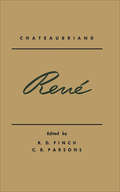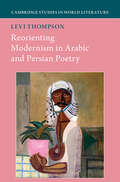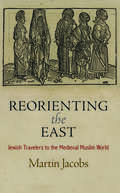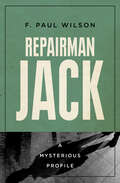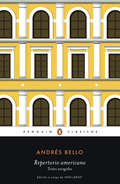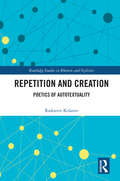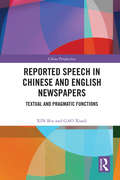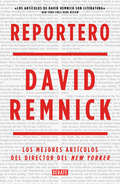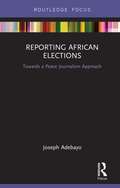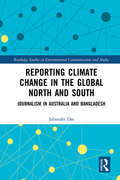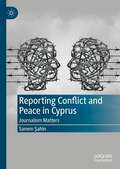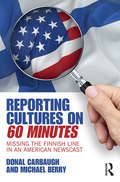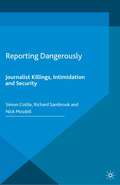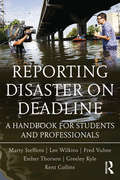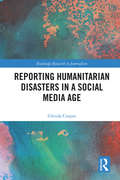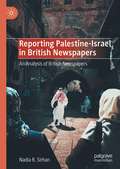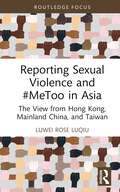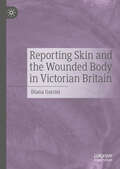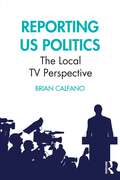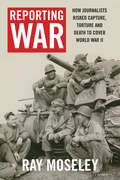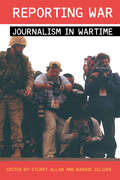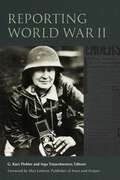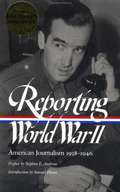- Table View
- List View
René
by C. R. Parsons François-René de Chateaubriand R. D. FinchIf the writings of Chateaubriand, one above all is both most representative of its author and most significant for reader and student alike. René, a milestone of literature, presents the first genuine and complete picture of that state of spiritual frustration and moral isolation known as le mal du siècle, its causes, symptoms, ravages, and cure.Chateaubriand, a prodigious artist with an incomparable style, enjoys the further distinction of having fused in his work the end of one epoch and the beginning of another. It is sometimes forgotten that these epochs are not only French but also European in scope, and their reverberations as expressed by Chateaubriand have affected almost every subsequent writer of importance up to the present. Chateaubriand is often called the father of romanticism. It may be claimed with equal reason that he is the grandfather of the neo-romanticism of our time.This edition of René contains, as well as a full introduction, notes covering the allusions to place names, events, and personages, and a complete vocabulary.
Reorienting Modernism in Arabic and Persian Poetry (Cambridge Studies in World Literature)
by Levi ThompsonRe-orienting Modernism in Arabic and Persian Poetry is the first book to systematically study the parallel development of modernist poetry in Arabic and Persian. It presents a fresh line of comparative inquiry into minor literatures within the field of world literary studies. Focusing on Arabic-Persian literary exchanges allows readers to better understand the development of modernist poetry in both traditions and in turn challenge Europe's position at the center of literary modernism. The argument contributes to current scholarly efforts to globalize modernist studies by reading Arabic and Persian poetry comparatively within the context of the Cold War to establish the Middle East as a significant participant in wider modernist developments. To illuminate profound connections between Arabic and Persian modernist poetry in both form and content, the book takes up works from key poets including the Iraqis Badr Shakir al-Sayyab and Abd al-Wahhab al-Bayati and the Iranians Nima Yushij, Ahmad Shamlu, and Forough Farrokhzad.
Reorienting the East: Jewish Travelers to the Medieval Muslim World (Jewish Culture and Contexts)
by Martin JacobsReorienting the East explores the Islamic world as it was encountered, envisioned, and elaborated by Jewish travelers from the Middle Ages to the early modern period. The first comprehensive investigation of Jewish travel writing from this era, this study engages with questions raised by postcolonial studies and contributes to the debate over the nature and history of Orientalism as defined by Edward Said.Examining two dozen Hebrew and Judeo-Arabic travel accounts from the mid-twelfth to the early sixteenth centuries, Martin Jacobs asks whether Jewish travelers shared Western perceptions of the Islamic world with their Christian counterparts. Most Jews who detailed their journeys during this period hailed from Christian lands and many sailed to the Eastern Mediterranean aboard Christian-owned vessels. Yet Jacobs finds that their descriptions of the Near East subvert or reorient a decidedly Christian vision of the region. The accounts from the crusader era, in particular, are often critical of the Christian church and present glowing portraits of Muslim-Jewish relations. By contrast, some of the later travelers discussed in the book express condescending attitudes toward Islam, Muslims, and Near Eastern Jews. Placing shifting perspectives on the Muslim world in their historical, social, and literary contexts, Jacobs interprets these texts as mirrors of changing Jewish self-perceptions. As he argues, the travel accounts echo the various ways in which premodern Jews negotiated their mingled identities, which were neither exclusively Western nor entirely Eastern.
Repairman Jack (Mysterious Profiles)
by F. Paul WilsonThe New York Times–bestselling author of The Keep tells the real and fictional origins of the mysterious man who battles criminals and the supernatural. In 1984, Repairman Jack debuted in F. Paul Wilson&’s horror thriller The Tomb. Jack would go on to star in twenty-three novels, ten short stories, and a graphic novel. But how did the antithesis of James Bond and Jason Bourne get his start in the battle between good and evil? In this essay, Wilson lets his readers in on how his beloved hero came to be. Wilson begins his personal story after he scored a hit with The Keep, when he found his inspiration for his next book in a dream. He discusses selecting and researching a monster, as well as developing Jack, his supporting cast, and settling on a villain. He also shares how the first title in the series came to be—it wasn&’t always The Tomb. Wilson closes with Jack&’s fictional backstory and his thoughts on Jack&’s potential future—if there is one . . .Praise for Repairman Jack &“One of the all-time great characters in one of the all-time great series.&” —Lee Child, #1 New York Times–bestselling author of the Jack Reacher series &“Repairman Jack is one of the most original and intriguing characters to arise out of contemporary fiction in ages. His adventures are hugely entertaining.&” —Dean Koontz, #1 New York Times–bestselling author of Strangers
Repertorio americano: Textos escogidos
by Andrés BelloLa gran antología de textos del primer humanista de América, realizada por el historiador Iván Jaksic <P><P> Además de ser una de las figuras más importantes en la construcción del orden político en la Hispanoamérica del siglo XIX, Andrés Bello fue, sin duda alguna, uno de los fundadores intelectuales de Chile. Su obra, como señala el historiador Ivan Jaksic, a cargo de la selección, <P><P> Repertorio americano reune sus textos más destacados en tres áreas. Un primer capítulo dedicado a la lengua y a la literatura, en donde se encuentra su emblemática introducción a la gramática de la lengua castellana para el uso de los americanos; un segundo capítulo que reune sus escritos sobre educación e historia, entre ellos el discurso de inauguración de la Universidad de Chile y sus estudios de jurisprudencia; finalmente, sus escritos sobre derecho, política y relaciones internacionales en donde el intelectual venezolano piensa y analiza distintos modos de gobernar en la nueva América, incluida su exposición de motivos del Código Civil, del que fue redactor e impulsor.
Repetition and Creation: Poetics of Autotextuality (Routledge Studies in Rhetoric and Stylistics)
by Radosvet KolarovThis book advances the notion of autotextuality, the dialogue between works in an author’s oeuvre, and the ways in which new texts are created in self-repetition through the tracing and revisiting of past texts and the subsequent uncovering of undisclosed meanings, unexhausted constructive principles, and alternative versions. Kolarov draws on cognitive models, such as dual coding theory and conceptual blending, to substantiate a theory of autotextuality and build on previous work on self-repetition and difference to highlight the notion of “discursive desire,” in which new meanings are generated through repetition, and its distinct relationship to creativity. Drawing on analyses of well-established works in Bulgarian as well as the established oeuvres of such authors as Gogol, Dostoevsky, Kafka, and Baudelaire, the volume explores key themes in autotextuality such as the functions of creative memory, the connections between word and image, and the hermeneutic relationships and steps of transformation between texts. This innovative work addresses topical questions of importance in literary theory today and will be of interest to students and scholars in literary studies and related areas of study within such fields as cognitive science, quantum mechanics, and psychology.
Reported Speech in Chinese and English Newspapers: Textual and Pragmatic Functions (China Perspectives)
by XIN Bin GAO XiaoliReported speech is a universal form across human languages. However, previous studies have tended to be limited because they mostly emphasize on the form and authenticity of reported speech, while its discourse and pragmatic functions have largely been ignored. Meanwhile, the studies mainly focus on English, with a comparative perspective with other languages largely missing. Acknowledging these limitations, this book analyzes the textual and pragmatic functions of reported speech in Chinese and English. The authors build a corpus comprising of twelve Chinese and English newspapers, including China Daily and The New York Times. They examine the classification and distribution of reported speech, the form and function in different news genres and contexts, and the socio-pragmatic interpretation of reported speech in news and other issues. This title can enrich comparative linguistic research, verify the feasibility of combining critical linguistics and corpus technology, and help improve the production and understanding of news reports. Students and scholars of critical discourse analysis, comparative linguistics, corpus linguistics, as well as communication studies will find this to be an essential guide.
Reportero: Los mejores artículos del director del New Yorker
by David RemnickLas mejores piezas del director del New Yorker, un maestro del periodismo contemporáneoDavid Remnick tiene el don poco común de revelar a los lectores el alma y la mente de las figuras públicas. Su penetrante mirada disecciona a políticos, escritores o púgiles, y su pluma sirve unos retratos perfectamente aliñados. Remnick logra combinar en sus vívidas piezas una extraordinaria claridad con la profundidad del mejor periodismo.Reportero reúne sus mejores textos de los últimos 20 años, desde la política estadounidense a la Rusia post soviética, pasando por Hamás, Tony Blair, Bruce Springsteen, Solzhenytsin o Philip Roth.
Reporting African Elections: Towards a Peace Journalism Approach (Routledge African Studies)
by Joseph AdebayoThe ability to be divided along ethnic and religious lines is inherent to much of Africa’s media. Such potentially divisive reporting has the ability to incite violence through prejudiced information, particularly during election processes.Reporting African Elections examines the impact of media messages on society, focusing on these electoral processes in Africa. Drawing upon the Peace Journalism approach to political reporting, this book offers a unifying conceptual framework for analysing the role journalists play in ensuring peaceful elections. Joseph Adebayo also looks at the impact training can have on election reportage, studying recent elections in Kenya and Nigeria in order to present a 17-point plan for reporting elections in Africa. Reporting African Elections will be of interest to scholars and students of journalism, peace and conflict studies, and politics.
Reporting Climate Change in the Global North and South: Journalism in Australia and Bangladesh (Routledge Studies in Environmental Communication and Media)
by Jahnnabi DasThis book reveals how journalists in the Global North and Global South mediate climate change by examining journalism and reporting in Australia and Bangladesh. This dual analysis presents a unique opportunity to examine the impacts of media and communication in two contrasting countries (in terms of economy, income and population size) which both face serious climate change challenges. In reporting on these challenges, journalism as a political, institutional, and cultural practice has a significant role to play. It is influential in building public knowledge and contributes to knowledge production and dialogue, however, the question of who gets to speak and who doesn’t, is a significant determinant of journalists’ capacity to establish authority and assign cultural meaning to realities. By measuring the visibility from presences and absences, the book explores the extent to which the influences are similar or different in the two countries, contrasting how journalists’ communication power conditions public thought on climate change. The investigation of climate communication across the North-South divide is especially urgent given the global commitment to reduce greenhouse gas emissions and it is critical we gain a fuller understanding of the dynamics of climate communication in low-emitting, low-income countries as much as in the high emitters, high-income countries. This book contributes to this understanding and highlights the value of a dual analysis in being ably draw out parallels, as well as divergences, which will directly assist in developing cross-national strategies to help address the mounting challenge of climate change. This book will be of great interest to students and scholars of climate change and environmental journalism, as well as media and communication studies more broadly.
Reporting Conflict and Peace in Cyprus: Journalism Matters
by Sanem ŞahinThis book studies journalism in Cyprus to understand how journalists negotiate their roles and responsibilities in conflict-affected societies. In Cyprus, journalism has navigated through the pressures and challenges of intercommunal and political tensions. The book outlines a historical context of the conflict, also known as the Cyprus problem and discusses the news media's involvement in it. However, the primary concern is journalists' perceptions of their professional roles and external forces affecting their work. It examines the impact of political, economic and organisational influences, media ownership and technological developments on their work through interviews conducted with journalists. It studies professional and ethical challenges journalists experience, especially when reporting intercommunal relations. Finally, it explores the impact of digital media on journalism and the public debate on the Cyprus problem.
Reporting Cultures on 60 Minutes: Missing the Finnish Line in an American Newscast
by Michael Berry Donal CarbaughThis work delves into the act of reporting on different cultures as a means of exploring our own. The way culture is presented to the media highlights various international and intercultural dynamics, as well as the complexity involved in reporting from a cultural standpoint. Reporting Cultures in 60 Minutes is a study covering the journalistic practice of reporting culture by examining "Tango Finlandia," a broadcast report on Finnish culture produced by the American television news magazine 60 Minutes. It covers the journalistic practice of reporting culture broadly by looking specifically at Finns and Americans reporting about their respective homelands and about the other’s culture and social interactions. Unique in its content and approach, this volume: Demonstrates how reports are constructed as deeply cultural forms, couched in points of view derived from one’s discursive habits and their meanings. Analyzes reporting done in professional practice/journalism as well as in common social routine. Offers a way through the process that can move reporting on culture from a self-reflective mirror to opening a window onto another cultural world. Scholars and students in communication, intercultural/international studies, and related areas will find much to consider in this work
Reporting Dangerously: Journalist Killings, Intimidation and Security
by Simon Cottle Nick Mosdell Richard SambrookMore journalists are being killed, attacked and intimidated than at any time in history. Reporting Dangerously: Journalist Killings, Intimidation and Security examines the statistics and looks at the trends in journalist killings and intimidation around the world. It identifies what factors have led to this rise and positions these in historical and global contexts. This important study also provides case studies and first-hand accounts from journalists working in some of the most dangerous places in the world today and seeks to understand the different pressures they must confront. It also examines industry and political responses to these trends and pressures as well as the latest international initiatives aimed at challenging cultures of impunity and keeping journalists safe. Throughout, the authors argue that journalism contributes a vital if often neglected role in the formation and conduct of civil societies. This is why reporting from ‘uncivil’ places matters and this is why journalists are often positioned in harm’s way. The responsibility to report in a globalizing world of crises and human insecurity, and the responsibility to try and keep journalists safe while they do so, it is argued, belongs to us all.
Reporting Disaster on Deadline: A Handbook for Students and Professionals
by Lee Wilkins Esther Thorson Martha Steffens Greeley Kyle Kent Collins Fred VulteeThis book provides an introduction to covering crises, considering practice issues and providing guidance in preparing for and responding to calamities. It offers a concise overview for journalism academics and practitioners of covering disasters – not a "how to" handbook but a "how to prepare" reference to be used before a crisis occurs. This essential resource is among the first to focus specifically and comprehensively on journalistic coverage of disasters. It demonstrates the application of scholarship and theory to professional practice, and includes a crash book template with logistical and information-collection requirements. As a text for advanced reporting, broadcast journalism, and journalism ethics, or a reference for professionals, Reporting Disaster on Deadline provides key information for keeping on deadline in responding to crises.
Reporting Humanitarian Disasters in a Social Media Age (Routledge Research in Journalism)
by Glenda CooperFrom the tsunami to Hurricane Sandy, the Nepal earthquake to Syrian refugees—defining images and accounts of humanitarian crises are now often created, not by journalists but by ordinary citizens using Twitter, Facebook, YouTube, Instagram and Snapchat. But how has the use of this content—and the way it is spread by social media—altered the rituals around disaster reporting, the close, if not symbiotic, relationship between journalists and aid agencies, and the kind of crises that are covered? Drawing on more than 100 in-depth interviews with journalists and aid agency press officers, participant observations at the Guardian, BBC and Save the Children UK, as well as the ordinary people who created the words and pictures that framed these disasters, this book reveals how humanitarian disasters are covered in the 21st century – and the potential consequences for those who posted a tweet, a video or photo, without ever realising how far it would go.
Reporting Palestine-Israel in British Newspapers: An Analysis of British Newspapers
by Nadia R. SirhanThis book examines the portrayal of the Palestinian-Israeli ‘conflict’ by looking at the language used in its reporting and how this can, in turn, influence public opinion. The book explores how language use helps frame an event to elicit a particular interpretation from the reader and how this can be manipulated to introduce bias. Sirhan begins the book by examining the history of the ‘conflict’, and the many persistent myths that surround it. She analyses how five events in the ‘conflict’ (two in which the Palestinians are victims, two in which the Israelis are victims, and Operation Cast Lead) are reported in five British newspapers: The Daily Mail, The Guardian, The Independent, The Daily Telegraph, and The Times. By looking at these events across a range of newspapers, the book investigates differences in the way that the media report each side, before exploring what factors motivate these differences – including issues of bias, censorship, lobbying, and propaganda.
Reporting Research
by R. S. ClymoWant to learn how to present your research successfully? This practical guide for students and postdoctoral scholars offers a unique step-by-step approach to help you avoid the worst, yet most common, mistakes in biology communication. Covering irritants such as sins of ambiguity, circumlocution, inconsistency, vagueness and verbosity, misuse of words and quantitative matters, it also provides guidance to design your next piece of work effectively. Learn how to write scientific articles and get them published, prepare posters and talks that will capture your audience and develop a critical attitude towards your own work as well as that of your colleagues. With numerous practical examples, comparisons among disciplines, valuable tips and real-life anecdotes, this must-read guide will be a valuable resource to both new graduate students and their supervisors.
Reporting Results
by William F. Hosford David C. Van AkenThis brief guide is ideal for science and engineering students and professionals to help them communicate technical information clearly, accurately, and effectively. The focus is on the most common communication forms, including laboratory reports, research articles, and oral presentations, and on common issues that arise in classroom and professional practice. This book will be especially useful to students in a first chemistry or physics laboratory course. Advanced courses will often use the same formatting as required for submission to technical journals or for technical report writing, which is the focus of this book. Good communication habits are appropriate in all forms of technical communication. This book is designed to help the reader develop effective communication skills. It is also ideal as a reference on stylistic and grammar issues throughout a technical career. Unlike most texts, which concentrate on writing style, this book also treats oral presentations, graphing, and analysis of data.
Reporting Sexual Violence and #MeToo in Asia: The View from Hong Kong, Mainland China, and Taiwan (Routledge Focus on Journalism Studies)
by Luwei Rose LuqiuThis book provides a comprehensive analysis of the role of news media and social media in the propagation and treatment of the global #MeToo movement.This comparative study uniquely spans Hong Kong, Taiwan, and mainland China—three culturally similar yet legally and politically distinct societies—to elucidate the variations in media systems in each society and the influence these differences bear on the role and impact of news media on social movements and rape culture. The author examines how journalistic coverage of rape cases and #MeToo has shaped public discourse, contributed to cyber activism, and influenced the strategies adopted by activists in these contexts, illuminating the complexities of news production processes, the influence of cultural contexts on media narratives, and the power of social media discourse. Taking into account the journalistic constraints and challenges in reporting sexual violence, effective strategies for public engagement and action are discussed alongside the potential for platforms to serve as support networks for survivors, proffering solutions for more effective and supportive reporting of sexual violence.Offering invaluable new insights into the relationship between news media and sexual violence, this book is recommended reading for advanced students and researchers of media, gender, and social change.
Reporting Skin and the Wounded Body in Victorian Britain
by Diana GarrisiDrawing on a wide range of primary sources, this book explains what made skin newsworthy in Victorian Britain. It represents a unique contribution to the media history of the human body by delving into the cultural and historical underpinnings of wound representation in Western culture. Employing a case study approach, the book provides a comprehensive exploration of the interplay between dermatology and the Victorian press. This work suggests that there was a mutually constitutive relationship between skin reporting and the formal evolution of news discourse during the nineteenth century. Narratives related to skin, such as wounds caused by corporal punishment, plagues resulting from neglect in workhouses, and occupational skin diseases, emerged as defining features of Victorian newspapers. Notably, media coverage of wounded skin assumed a central rhetorical position in debates pertaining to discipline, abuse, poverty, labour, and social norms, a legacy still discernible in contemporary journalism. Analysing the mediation of the wounded body in Victorian Britain offers a unique insight into the foundations of modern journalism. It sheds light on the impossibility of maintaining an objective framework when observing and reporting on bodies in pain. Paradoxically, news writers and commentators of that era navigated this challenge by encapsulating such narratives within rhetorical constructs that provided a template for the evolution of contemporary news values.
Reporting US Politics: The Local TV Perspective
by Brian CalfanoWith a particular focus on the United States, this book offers a practical guide to writing and delivering sound political TV news coverage.Beginning with a historical overview of political reporting, and contextualizing political journalism and local TV news within wider industry issues, this book goes on to offer an essential understanding of the complex decision-making inherent in this critical form of journalism today. In accessible and engaging language, Calfano introduces students to all the basics of local political TV reporting—writing, shooting, editing, and producing—touching on long-form interviewing, political "talkbacks," election coverage, using data, and investigative journalism as a means of uncovering political stories. Readers will learn about working the political beats, from the City Hall to the Statehouse and from policy to budgets, in a way which is both compelling and ethical. A chapter on local, state, and federal government acts as a quick reference primer to the US political landscape. Each chapter includes a series of reflection exercises and ideas for exploring political coverage from the perspectives introduced, and case studies help readers translate what they’ve learned into real-world practice. This book also features a list of quick hacks for political reporters and a political resource list which TV news reporters and producers can go to for sources and government information.This textbook is essential reading for anyone aspiring to become a reporter, producer, or news manager in the United States and will also be of great value to students of Political Journalism, Broadcast Journalism, and Local TV News worldwide.
Reporting War: How Foreign Correspondents Risked Capture, Torture and Death to Cover World War II
by Ray MoseleyThis &“excellent, wonderfully-researched&” chronicle of WWII journalism explores the lives and work of embedded reporters across every theater of war (Chris Ogden, former Time magazine bureau chief in London). Luminary journalists Ed Murrow, Martha Gellhorn, Walter Cronkite, and Clare Hollingworth were among the young reporters who chronicled World War II&’s daily horrors and triumphs for Western readers. In Reporting War, fellow foreign correspondent Ray Moseley mines their writings to create an exhilarating parallel narrative of the war effort in Europe, Pearl Harbor, North Africa, and Japan. This vivid history also explores the lives, methods, and motivations of the courageous journalists who doggedly followed the action and the story, often while embedded in the Allied armies. Moseley&’s sweeping yet intimate history draws on newly unearthed material to offer a comprehensive account of the war. Reporting War sheds much-needed light on an abundance of individual stories and overlooked experiences, including those of women and African-American journalists, which capture the drama as it was lived by reporters on the front lines of history.
Reporting War: Journalism in Wartime (Digital Media And Society Ser.)
by Stuart Allan Barbie ZelizerReporting War explores the social responsibilities of the journalist during times of military conflict. News media treatments of international crises, especially the one underway in Iraq, are increasingly becoming the subject of public controversy, and discussion is urgently needed. Each of this book's contributors challenges familiar assumptions about war reporting from a distinctive perspective. An array of pressing issues associated with conflicts over recent years are identified and critiqued, always with an eye to what they can tell us about improving journalism today. Special attention is devoted to recent changes in journalistic forms and practices, and the ways in which they are shaping the visual culture of war, and issues discussed, amongst many, include: the influence of censorship and propaganda 'us' and 'them' news narratives access to sources '24/7 rolling news' and the 'CNN effect' military jargon (such as 'friendly fire' and 'collateral damage') 'embedded' and 'unilateral' reporters tensions between objectivity and patriotism. The book raises important questions about the very future of journalism during wartime, questions which demand public dialogue and debate, and is essential reading for students taking courses in news and news journalism, as well as for researchers, teachers and practitioners in the field.
Reporting World War II (World War II: The Global, Human, and Ethical Dimension)
by G. Kurt Piehler and Ingo TrauschweizerThis set of essays offers new insights into the journalistic process and the pressures American front-line reporters experienced covering World War II. Transmitting stories through cable or couriers remained expensive and often required the cooperation of foreign governments and the American armed forces. Initially, reporters from a neutral America documented the early victories by Nazi Germany and the Soviet invasion of Finland. Not all journalists strove for objectivity. During her time reporting from Ireland, Helen Kirkpatrick remained a fierce critic of that country’s neutrality. Once the United States joined the fight after the Japanese attack on Pearl Harbor, American journalists supported the struggle against the Axis powers, but this volume will show that reporters, even when members of the army sponsored newspaper, Stars and Stripes were not mere ciphers of the official line.African American reporters Roi Ottley and Ollie Stewart worked to bolster the morale of Black GIs and undermined the institutional racism endemic to the American war effort. Women front-line reporters are given their due in this volume examining the struggles to overcome gender bias by describing triumphs of Thérèse Mabel Bonney, Iris Carpenter, Lee Carson, and Anne Stringer.The line between public relations and journalism could be a fine one as reflected by the U.S. Marine Corps’ creating its own network of Marine correspondents who reported on the Pacific island campaigns and had their work published by American media outlets. Despite the pressures of censorship, the best American reporters strove for accuracy in reporting the facts even when dependent on official communiqués issued by the military. Many wartime reporters, even when covering major turning points, sought to embrace a reporting style that recorded the experiences of average soldiers. Often associated with Ernie Pyle and Bill Mauldin, the embrace of the human-interest story served as one of the enduring legacies of the conflict.Despite the importance of American war reporting in shaping perceptions of the war on the home front as well as shaping the historical narrative of the conflict, this work underscores how there is more to learn. Readers will gain from this work a new appreciation of the contribution of American journalists in writing the first version of history of the global struggle against Nazi Germany, imperial Japan, and fascist Italy.
Reporting World War II: American Journalism 1938-1946
by Samuel Hynes Nancy Caldwell Sorel Anne Matthew Roger J. SpillerHere, for the first time in paperback, the work of more than 50 remarkable reporters has been drawn from original newspaper and magazine reports, radio transcripts, and wartime books to capture the intensity of World War II's unfolding drama.
